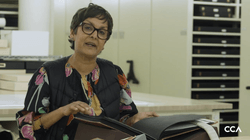13 March 2025 to 20 March 2025
Where We Grow Older
The documentary Where We Grow Older (CCA, 2023, 30 min) looks at how the growing ageing population is reshaping architectural and social constructs and questions the role of urban design and politics in facing these challenges. The film investigates two models of how care and housing can be reconceived in light of prolonged lives: public housing and the creation of a new(...)
Where We Grow Older
Actions:
Description:
The documentary Where We Grow Older (CCA, 2023, 30 min) looks at how the growing ageing population is reshaping architectural and social constructs and questions the role of urban design and politics in facing these challenges. The film investigates two models of how care and housing can be reconceived in light of prolonged lives: public housing and the creation of a new(...)
Join us Wednesday November 20 from 4–7 pm to honour the women who planned and designed our built environment. This event is free and open to the public.
Study Room
20 November 2024, 4pm to 7pm
Wiki Edit-a-thon: Foregrounding Canadian Women Architects
Actions:
Description:
Join us Wednesday November 20 from 4–7 pm to honour the women who planned and designed our built environment. This event is free and open to the public.
Study Room
research
research
May 2023 to
September 2023
research
events
Learning from… China
In Urbanising Southern China: Poverty, Minorities, and Development, Gregory Guldin examines the social and environmental consequences of accelerated industrialisation in China, as agricultural villages become dense urban agglomerations at unprecedented rates. A specialist in Chinese urbanisation, ethnicity, and politics, Gregory Guldin is Professor of Anthropology at the(...)
3 May 2007
Learning from… China
Actions:
Description:
In Urbanising Southern China: Poverty, Minorities, and Development, Gregory Guldin examines the social and environmental consequences of accelerated industrialisation in China, as agricultural villages become dense urban agglomerations at unprecedented rates. A specialist in Chinese urbanisation, ethnicity, and politics, Gregory Guldin is Professor of Anthropology at the(...)
events
3 May 2007
Into the Island
Into the Island follows Xu Tiantian of DnA in her discovery of essential elements, pressure points, and issues on the destabilizing terrain that is the ocean and its delicate ecosystem of Meizhou Island. It is the first chapter in a three part film and exhibition series, Groundwork.
2024
Into the Island
Actions:
Description:
Into the Island follows Xu Tiantian of DnA in her discovery of essential elements, pressure points, and issues on the destabilizing terrain that is the ocean and its delicate ecosystem of Meizhou Island. It is the first chapter in a three part film and exhibition series, Groundwork.
To Build Law
To Build Law, the forthcoming documentary directed by Joshua Frank and exhibition curated by Francesco Garutti, will follow bplus.xyz (b+) as they establish a policy lab, HouseEurope.eu, to propose industry reforms and shift cultural norms. To Build Law will closely observe the b+ team during various phases of conceptualization and development of a European Citizens’(...)
11 December 2024 to 25 May 2025
To Build Law
Actions:
Description:
To Build Law, the forthcoming documentary directed by Joshua Frank and exhibition curated by Francesco Garutti, will follow bplus.xyz (b+) as they establish a policy lab, HouseEurope.eu, to propose industry reforms and shift cultural norms. To Build Law will closely observe the b+ team during various phases of conceptualization and development of a European Citizens’(...)
The 2024 Toolkit for Today explores imaginative, material, and methodological paths to collectively navigate how queer and trans* theory can offer critiques of power that allow for the revision of some of the core concepts and ontologies of architectural history.
22 July 2024 to 26 July 2024
Toolkit for Today: Cross Wor(l)ds/Queer Wor(l)ds
Actions:
Description:
The 2024 Toolkit for Today explores imaginative, material, and methodological paths to collectively navigate how queer and trans* theory can offer critiques of power that allow for the revision of some of the core concepts and ontologies of architectural history.






